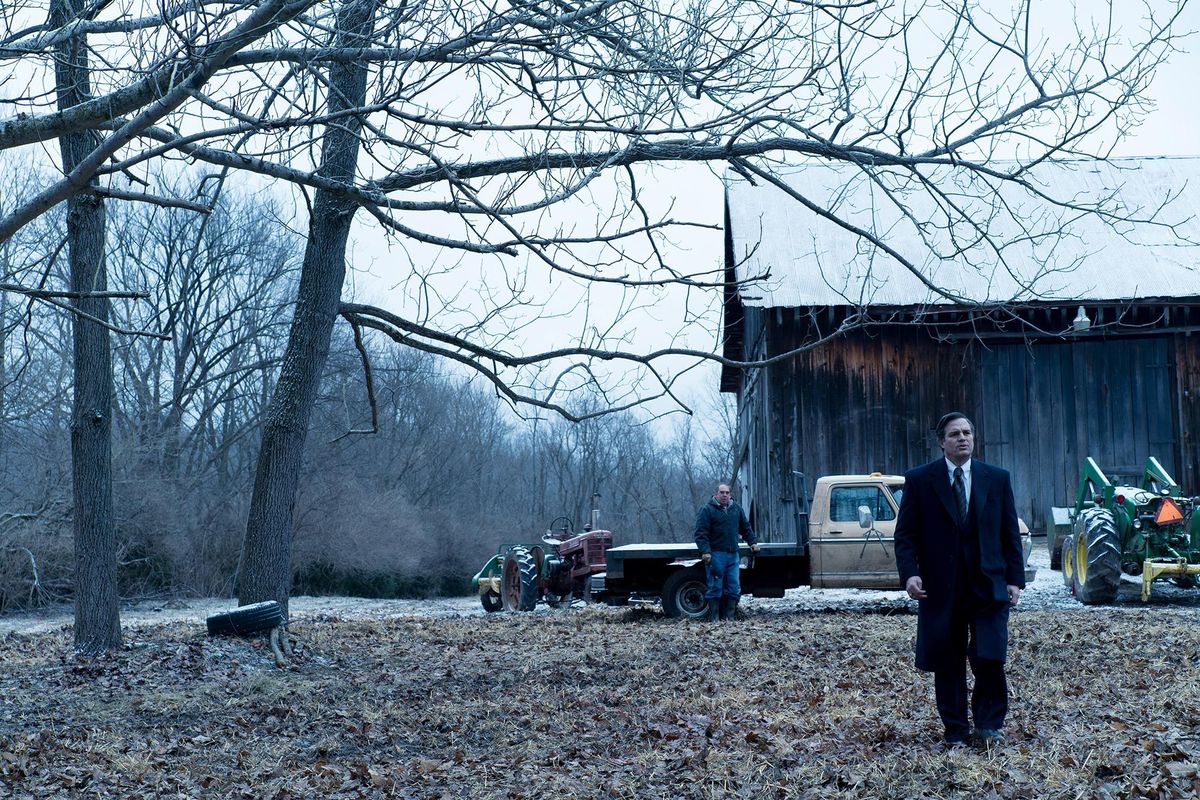By avoiding typical showboating, ‘Dark Waters’ doesn’t sink

There are a few notable disappearing acts being performed in “Dark Waters,” a fact-based – and decidedly unflashy – drama about the corporate lawyer who sued DuPont for, in essence, poisoning a West Virginia community with a chemical used to make Teflon.
The most obvious one is undertaken by the film’s producer and star, Mark Ruffalo, who, as real-life Cincinnati attorney Rob Bilott, erases his movie-star persona beneath an unflattering haircut, cheap suit, bad posture and the ever-present pout (and jutting lower lip) of an avenging nebbish.
The second is by Bill Camp as Wilbur Tennant, the Parkersburg cattle farmer who first noticed that his cows were dying off in high numbers and who sought the assistance of Bilott because Tennant knew the lawyer’s mother.
We’re used to seeing Camp, one of the great unsung character actors, vanish inside a role, and here he does it again delivering his lines with a gruff affect and thick accent that is unintelligible much of the time. It’s not a flaw of the performance. This detail is wholly accurate according to the New York Times article that inspired the film.
But perhaps the most superficially startling disappearing act is the one performed by the film’s director, Todd Haynes, who brings a sort of aggressive stylelessness to a subject that initially seems a surprising choice for the director of the lavishly cinematic period pieces “Carol” and “Far From Heaven.”
It is arguably not that much of a departure for a shapeshifting filmmaker whose varied résumé also includes a film in which six actors play Bob Dylan; the glam-rock musical “Velvet Goldmine”; and his 43-minute breakout film “Superstar” – the story of singer Karen Carpenter told entirely with Barbie and Ken dolls. And let’s not forget “Safe,” in which Julianne Moore played a woman with multiple chemical sensitivities.
But “Dark Waters” feels like the kind of issue film that almost anyone could have made. The issue, in this case, being not just about DuPont – a company that, as evidence in the film shows, was aware of the dangers of its Teflon ingredients for many years before Bilott’s fight – but the fight for stronger environmental protections against corporate malfeasance.
The film’s production company, Participant Media, has launched a campaign – in conjunction with Ruffalo, wearing his activist hat – titled “Fight Forever Chemicals.” The term refers to often-toxic man-made substances that do not break down in the environment and build up in humans and animals over time.
As such, “Dark Waters” is an effective outrage machine: If you like “Erin Brockovich,” you’ll probably like this, too, although Ruffalo’s schlubby crusader, despite the clunker he drives and his degree from what we’re told is a “no-name” law school, doesn’t have quite the same working-class pizazz that Julia Roberts brought to that 2000 role.
Anne Hathaway, playing Bilott’s wife, is one performer who never quite disappears into her character, always seeming like the glamorous Hollywood actress in search of an Oscar moment, in what amounts to a thankless supporting role.
Still, “Dark Waters” is a solidly built film – because of its lack of features rather than despite it. There are other good performances, including Tim Robbins’ turn as Bilott’s conflicted boss, the head of the corporate law firm who let his employee bite the hand that feeds them.
But Victor Garber doesn’t bring much nuance to the role of an obstructionist DuPont attorney, and Bill Pullman, who shows up late in the game as a country lawyer who helps Bilott drive home the knife in the case against the chemical giant, seems to have based his performance on every cinematic legal shark hiding behind an aw-shucks grin who has come before him.
“Dark Waters” doesn’t aspire to be something it’s not. Like Bilott himself, it gets the job done – not by showboating but by laying out the facts.